Every year there is more and more news about heat records that are climbing higher than ever. Because of that fans are very popular, and are disappearing from shelves fast when the summer sun begins to shine.
But do fans really cool the air in the room or is this only a myth? Let’s find out once and for all.
There is no reason to leave a fan running when you are not in the room. The heat from the motor actually increases the room temperature.

A fan does not cool down the air temperature in the room because the fan is only circulating air. The reason why we might think that it makes the room cooler is that the moving air helps to evaporate the sweat on our skin which is how we eliminate body heat if needed.
How Does a Fan Make You Feel Cooler?
The human body is an extremely sophisticated system. You don’t need a sensor to let you know when to start to cool it down or save some energy. If you are healthy, your body will regulate your body temperature automatically and very efficiently.
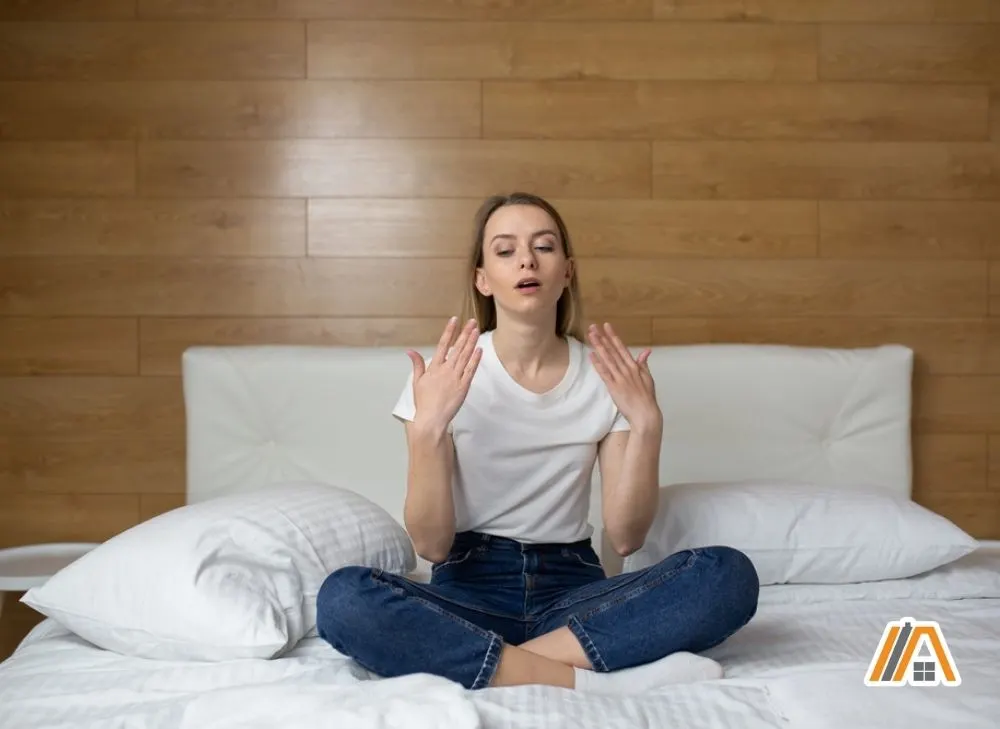
The human body has millions of sweat glands that will help you to regulate your body temperature.
Airflow coming from the fan will help the sweat on your skin to evaporate and that is how the fan cools you down.
Sweating does not cool the body unless the moisture is removed from the skin by evaporation. It means that if the air is not colder than your body temperature (95°F). The fan can actually increase your body temperature.
This happens because on a very hot and humid day; the sweat building up on your skin will not evaporate very effectively. The high-temperature airflow from the fan is just making it more difficult for your body to lose its heat by sweating.
At What Temperature Do Fans Become Ineffective?
Have you ever thought that there can be a temperature from which the fan becomes useless at providing a cooling feeling and you are just wasting money on running it?
As we explained before the way a fan works is to create airflow over our skin that helps to evaporate sweat. The human body is regulating temperature by reducing it when necessary by sweating.
Human skin temperature can be between 92,3-98,4°F(33,5-36,9°C), which means that the room temperature needs to be lower than your body temperature.
Fans are losing their efficiency when the air that they move is higher than 91°F(33°C)
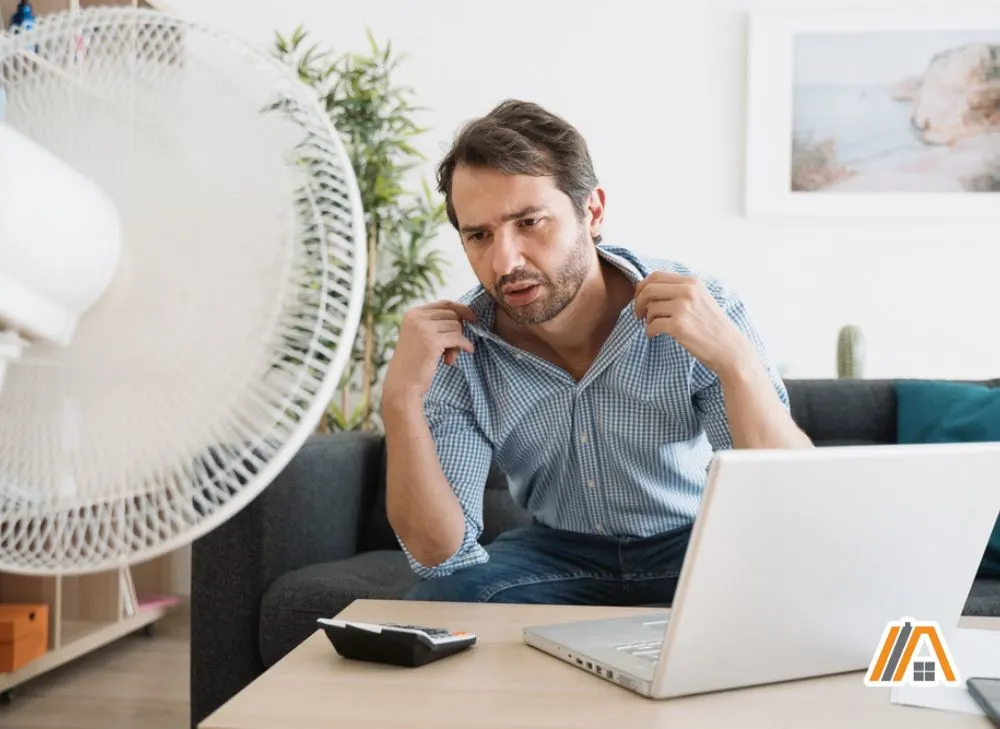
Can Too Many Fans Make a Room Hotter?
Sometimes less is better. This can also be the case with fans in a room.
As we talked about before here, there is no electric motor that is 100% efficient. This means that all the energy that is not used for moving the fan blades will be transferred into heat.
Some people think that leaving the fan running all day in their bedroom will cool down the room. In the evening when it’s time for bed, they will be surprised to find that the bedroom is the warmest room in the house.
If you are thinking that one small motor won’t create so much heat, then you are right. But if you have multiple fans running in the room then they can significantly increase the room temperature.
When you have a room that has good insulation and all the doors and windows are closed while you are running your fan the room temperature will rise.
It will make no difference in which corner of the room the fan is placed or how low or high it is.
Placing your fan in front of an open window will bring in the air from the outside but it will help only if the outside temperature much lower than the room temperature. The same principle works with bathroom fans as well. They only cool the room if the outside temp is lower.
Can Fans Be Bad for You?
Most times it’s nice to have a chilling breeze of air flowing over you on a hot day. But is there be a downside to it?
Dehydration And Dry Skin
The breeze from the fan will evaporate sweat from your skin at an accelerated rate. This can cause dehydration and dry skin.
People with chronically dry skin should be even more careful using the fan. On hot days it is common for people not to drink enough. By not drinking enough water and sitting in front of the fan is a recipe for dehydration and dry skin.
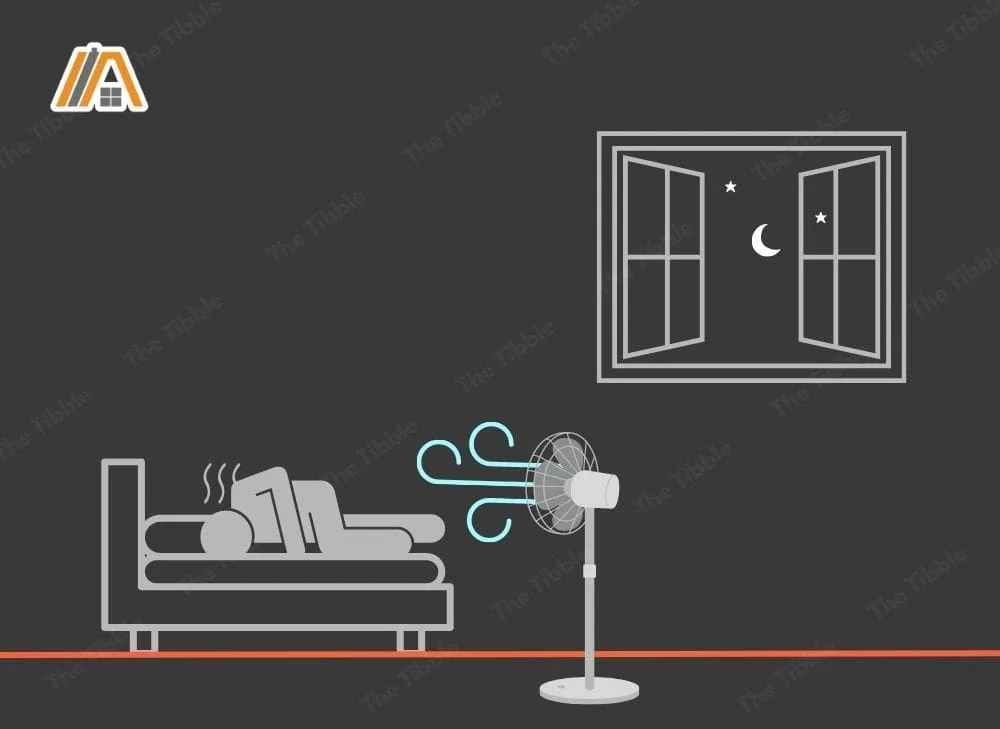
Many of us sleep with our mouth and eyes a little open. This may be a problem if you would like to keep the fan on all night. This can lead to a sore throat and irritated eyes.
Running a fan all day long can also dry out your nasal passages. Since the fan moves air around the room, it will take with it all the dust particles that are usually on the floor or furniture. This can cause major problems for people with allergies.
When we sweat, we lose the water that our body needs. In the daytime, you will feel it and drink more as necessary. But at night-time leaving the fan on will make you lose even more water.
Your body will lose more water than normal and that’s why some mornings you can wake up with back pain, sore muscles, or your morning can start with the worse headache ever.
Dust And Pollen
Keeping your fan, and room clean is a good idea for everyone. However, it is extremely important if you have allergies. Because the air will move pollen and dust particles around in the room and you will breathe them in through your nose. Then it will move up to your sinus and this can trigger an allergic reaction.
Moist air
Maybe you would not think of this, but there is even a chance that a running fan can raise your body temperature. It can happen when it is very hot and humid.
It may happen when the temperature in the room is above 95F°(35c°)
Too much moisture in the air makes losing heat through sweating more difficult for our body. When you add a breeze of hot and humid air it becomes even worse.
Are Fans Good for Cooling?
If you are looking to invest in something that will cool down your living space then fans are not what you are after.
Fans are not good for cooling because they do not cool the room, they only make it easier for the sweat to evaporate thanks to the air flow from the fan.
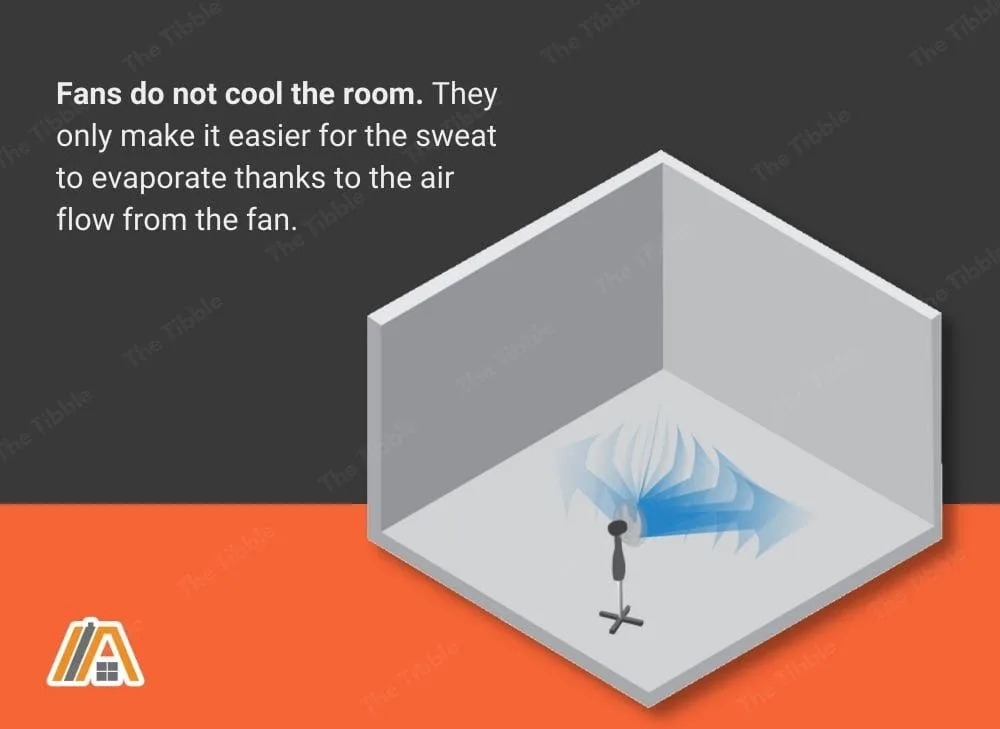
However, they can be used to move cold basement air upstairs, which can help to cool other rooms in the house. They can also be used to cool your pantry.
If you wish to find a cheap solution to cool down your room you should look at mini ac units.
Read more about mini AC units.
Should You Run an Air Conditioner And a Ceiling Fan Together?
Can you mix AC and a fan together as you do it with ice-cream and chocolate? 🙂 Let’s see…
The first good thing about using the fan and the AC together is that you can use both on a lower speed setting. This can eliminate cool spots in front of the ac unit and give you a more evening temperature around the house.
The fan will help to circulate the cold air coming from the AC around the room. Running both on lower settings will also save you some money on the electricity bill.
It’s good to know that, If you combine the AC with a fan you can easily raise the temperature of the room a couple of degrees without noticing the difference.
The air circulation from the fan will make the air breeze on your skin feel chilly enough. Every degree you increase the temperature on the AC will save you 5% on your energy bill.
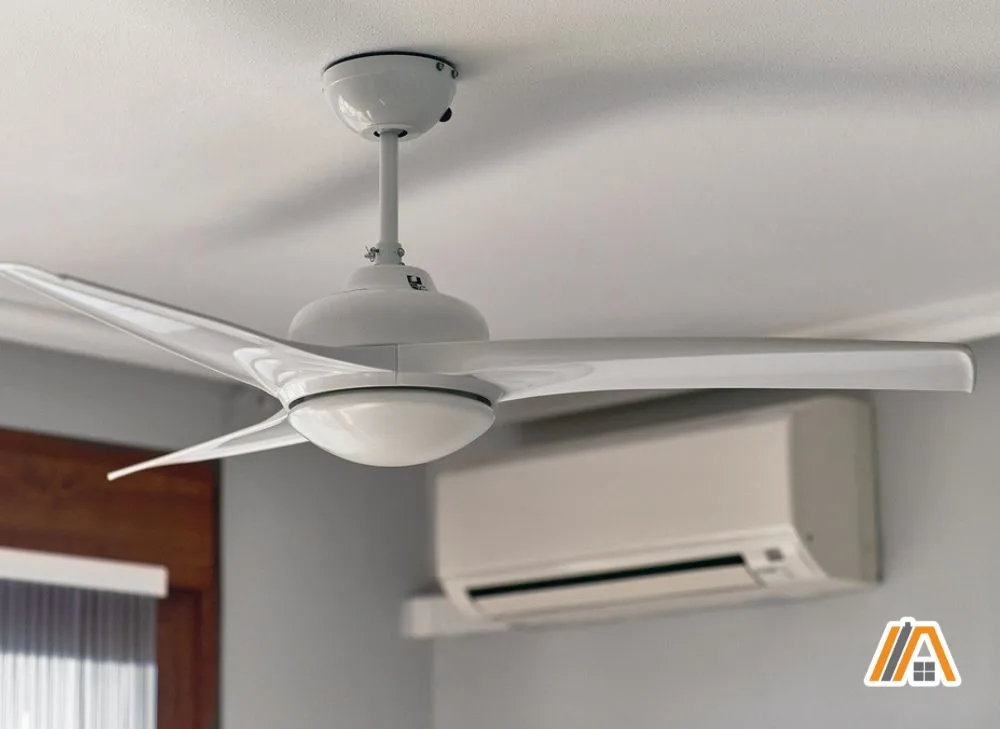
There is one more benefit to using a fan together with an AC.
After switching off your AC, the room temperature will start to rise quite rapidly, this is because warm air will rise and the cooler will stay near the floor.
By turning on your fan you can mix the cold and warm air and you can enjoy a cool room longer without turning on the AC.
Do Fans Reduce Humidity?
When running a fan in the closed room the humidity level will not change because the moisture has no place to escape.
The main goal of a fan is to circulate the air around the people and help the sweat on your skin to evaporate.
Placing the fan on the window can help to bring in the air from the outside. And if the outside air is drier than the inside air it will reduce humidity. But generally, when it is too humid indoors, it is also very humid outside as well.
To reduce humidity in the room it is best to use an AC or a dehumidifier.
In most places, a fan can be used rather effectively in lieu of a central AC unit (they are certainly cheaper to install!). Here you can find the average electricity usage and cost of running 11 different types of fans.
